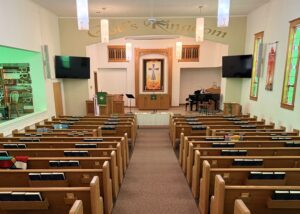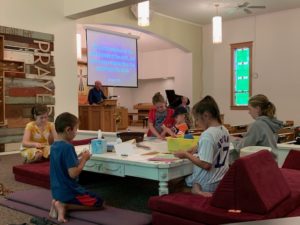Join Us Sunday Mornings

10 A.M. Worship

Teaching & Preachings
Genesis 1:26 says;
Then God said, “Let us make man in our image, after our likeness. And let them have dominion over the fish of the sea and over the birds of the heavens and over the livestock and over all the earth and over every creeping thing that creeps on the earth.”
Recent Devotionals
March 2021
Recent Posts

LET MIRACLES ABOUND

Including excerpts and a story inspired by Brother Benet Tvedten, a monk at Blue Cloud Valley monastery in South Dakota, in his book, “The View From the Monastery.”
Back in the 6th century, one of the greatest Popes of all history reigned over the church in what became one of the church’s brightest eras. Pope Gregory was known as “The Great,” and was so beloved by all Christians, especially Italians, that when he died, he was immediately given the honor and title of “Saint.”
But, going into his religious achievements is not the goal here. Instead, I will be presenting Saint Gregory as the “character” he played in many legends and fables of his day. Whenever a discussion would bend into the direction of miracles, this Pope Gregory story about Saint Benedict often came up. Here’s how it goes.
The deacon Peter, a long serving and trusted assistant to Pope Gregory the Great, asked the Pope: Were St. Benedict’s miracles “worked by prayer, or at the drop of his hat?”
Pope Gregory had just completed a biography of Benedict, the famous monk and abbot who wrote the primary book of “rules” for many monasteries, even to this very day. In that biography, Gregory, being a “big fan” of Benedict, spun many yarns about the miracles that Benedict had performed in his life.
For instance, in Gregory’s biography, St. Benedict brought back to life one of his brother monks; also raised from the dead the child of a local farmer; cured leprosy and insanity, cast out devils, etc. … well, you get the idea. If Benedict had indeed performed all the miracles attributed to him by Gregory in his biography, then Benedict would most likely be sitting at the right hand of God this very moment. And perhaps he is.
So, now that we know a little backstory, let’s return to the question deacon Peter asks his Pope: Were St. Benedict’s miracles “worked by prayer, of at the drop of the hat?”
Gregory responded to deacon Peter by stating that “holy men can undoubtedly perform miracles in either of the ways you mentioned.”
Obviously, Pope Gregory was a big believer in miracles. During his reign, Italy was in a state of despair due to the constant invasions from barbarian armies. The Pope wanted to lift the hopes of the people, so he reminded them in the best ways he could, that indeed, miracles are possible, and miracles are happening every day. Gregory loved to tell his miracle stories whenever he got the chance.
The Pope brought light to the people in some very dark times. He used their own faith to lift their spirits, by reminding them who they were and whose they were. He told them what they had forgotten; that Italy was a land of saints, and a land favored by God.
These were deeply faithful people – think about it for a minute: these people are the 6 century spiritual descendants of Jesus Christ and his original followers. They were still mighty robust in their faith and solidly grounded in the church. They were ripe for miracle stories! They believed all of them, and were better off for their belief.
Now, back to the story of deacon Peter and Pope Gregory. After the Pope tells his deacon that holy men could perform miracles any way they wanted, Peter had a follow-up question.
He asked the Pope: “How is it that we cannot find people of this type today?”
And, as the old story goes, Pope Gregory says, “I believe there still are many such people in the world, Peter. One cannot conclude that there are no great saints just because there are no miracles. The true estimate of life, after all, lies in acts of virtue, not in the display of miracles.” The Pope concluded: “There are many, Peter, who without performing miracles, are not at all inferior to those who perform them.”
I have shared this story with you because I worry that the people of the church today are ready and willing to write off miracles. Many Christians believe that “miracles” are not an option anymore. They have faith in modern human capacities to solve all problems. They scold some of us miracle believers for not thinking rationally or worldly. Of course, I am tempted to respond with the modern cliché: “And how’s that workin’ for ya?”
But this is very important. It’s a faith check. To me, writing off miracles is like writing off God. I define a miracle as “anything only God can do.” And, by my definition, miracles are happening all around us. Starting with you. Only God could create you, and all that you are. So, that makes you a miracle! Me too! All of us!!
Let’s get back to some basics, and let’s start with the faith and trust that God really is still happening here, and because of that, unceasing miracles are all around us. And we, as the people of God’s church, should be, and can become again, God’s miracle workers.
That’s really what I love most about the church – when I get to be a part of a worship service or an outreach ministry or a bible study or whatever – that turns into a miracle right before my very eyes. Trust me, I’ve seen you there too!
So, for this week, as we approach the back turn toward the end of Lent, let’s lift up our faith to the point of miracle believing, and miracle working. Then, when we get there, we will most certainly experience the miracle on Easter in a brand-new way.
<>< <>< <>< <>< <>< <>< <><
Read more

RACHEL’S VOICE LIVES ON

“How to Welcome Young People to the Mainline Church”
Rachel Held Evans (above) was just 37 years old when she died unexpectedly in 2019 of brain swelling. She was one of those contemporary “movers & shakers” in the arena of dragging Christianity in America into the 21st century. Rachel was an Episcopalian, although she soon tired of the culture wars that the church seemed to be continuously fomenting, so she stepped out on her own and discovered her path with Jesus … her calling in this church renewal movement that we are all a part of.
Rachel was a writer and speaker with an important voice for the church. Rather than focus on judging others who are not like us and figuring out how best to exclude them, she instead took the Jesus approach. It still sounds crazy, but Rachel wanted the church to love everyone just as Jesus loved the church. So, she would say, her ministry was trying to figure out how to reach out to all the outcasts and unwanted based on the current Christian church approach, and make all of those left behind the focal point of the church’s love.
I think we all know where she got that idea. It’s just that we’re not used to someone standing up for Jesus like that, and scolding the church for what it had become. Bottom-line: in many cases, in a variety of ways, that church today in America does not look like the Body of Christ in the world. Rather, the church often looks more like the Pharisees of the 1st century, instead of the Jesus followers of the 21st century.
Rachel Held Evans was a hero to many, and she shined lights on the dark corners of the modern-day church that exposed it for what it was … a human led organization that claims Jesus as Lord, but really uses self-made beliefs and truths about Jesus as the principles they live by. And, unlike Jesus, that ends up leaving many of God’s precious children outside the walls of the church. If today’s church could only build bridges to all of the left-out populations they’ve created, we would be doing Jesus a great service to begin building back His church.
Today, let’s start with one of those left out groups: How to welcome young people to the mainline Christian church today. In May 2015, Rachel wrote an essay for her blog that offers 7 ways to attract and keep young adults and parents of young children. Here are her 7 suggestions for us. Let’s consider how these ideas could impact our plans at Vine Street Christian Church as we prepare to move beyond the COVID-19 era and into our new future together.
- Update Your Website: Young folks tend to start their search for anything by using the web. We have been blessed with some internet angels at our church who have brought us into the modern technological era, but we are still at minimum impact. We should continue to enhance and upgrade our website and Facebook page so that it is inviting and attractive to this critical group of folks.
- Take Risks on Unconventional Church Plants: Sometimes the goal of a church should not be to attract more people to their one way and time of doing worship, but rather create a way and time to meet young people and parents where they are in their daily life. (Sunday morning at 10am is not always conducive to the millennium lifestyle.) What about a mini-church for small groups that is convenient and relevant to them? What about a dinner church? What about a front porch church? What about a silent meditative church that only listens for God?
- Infuse the Traditional Liturgy and Sacraments with Creativity: Research shows us that many young people appreciate the traditions and rituals of the church, but would prefer that they be enhanced creatively in a way that makes them meaningful to everyone, and not just the senior members of the congregation who have been sitting through the same routines for ages. Let’s bring these parts of the service to life and to relevance through the eyes of the young.
- Relax a Little: We are blessed at Vine Street these days with a diverse group of participants from different walks of life and with different views on the issues of the day. And that’s how it should be! But, to keep that great spirit alive, the service should be devoid of an atmosphere of stuffiness and stiffness. Saying, “but we’ve always done it this way,” is the same as telling a child, “you can look, but please don’t break anything.” And we all know how fun it never was to hear those words! Let’s be relaxed, have good fellowship, be ourselves, and lighten up.
- Don’t Assume We Know Why You Believe What You Believe, or Why You Do What You Do: Even though many of us have more experience with church, many more do not. When they enter our church, it should not feel like a test they need to figure out on their own. It should be instead, a comfortable and calming experience that allows each person to know and understand what we’re doing and why. It’s always a good idea to include “Church 101” elements in each service, so that everyone is on the same page; no secrets.
- Challenge Us: Offering “Church 101” elements in the service does not mean dumbing down the faith and trying to make the most important lessons we can learn in life into a pre-scripted made-to-order self-help manual with only the things you must believe in to be just like us. The church should not, and cannot, be afraid of pushing and challenging young adults in their walk with Jesus. After all, just ask the 12 disciples if Jesus was challenging or not!
- Help Us Build Lasting Relationships: A real “church” based on the teachings of Jesus must have methods and practices to bring together small groups of people so that they can experience what the Holy Spirit is like when believers gather together to share openly and honestly, and to learn about Jesus as well. In many ways, that is the definition of church – the Body of Christ in the world today. The worship service alone cannot fulfill that need. True and lasting Christian friends are formed in places where our faith, doubts, questions, ideas, struggles and joys, can all be shared, knowing that the Spirit of Jesus will be the only basis for discussing them.
We are now entering the next phase in our growth as a church. The circumstances in the world this past year have created a great opportunity for us to make leaps and bounds in becoming who Jesus is calling us to be. That opportunity does not come along very often in a lifetime. I say, let’s grab this opportunity we have and embrace it together, whole-heartedly.
Let’s do now, what in the future, the participants of Vine Street Christian Church will say was the turning point in the history of our church.
Loaves & Fishes, Pastor Bob <><
<>< <>< <>< <>< <>< <>< <><
Read more

VICTORY BY GRACE

The very first time I was in Arthur, Illinois, I was meeting with the search team of Vine Street Christian Church so that we could best discern God’s wishes for their vacant Minister position. You might not be surprised to know that the visit went very well. I wasn’t surprised.
All the previous phone interviews were truly spirit-led, and I and the members of the search team were being spirit-fed. God was working in our midst in a tangible way that we could feel, and hear, and see. And, after my first visit, God continued to show us the way of His will, and ultimately God brought us together.
But there is one thing about that trip that has continued to stay in my heart; the drive out to The Great Pumpkin Patch to meet Bruce Condill. Seems the search team thought it might be a good idea for me to meet the man who serves as the “wise sage” farmer in the field of spiritual harvesting. They were right.
The visit to the Patch to meet Bruce further affirmed to me that God had a vision for me and for your church to be joined together. 2 specific things I remember about meeting Bruce.
One, he showed me some of his book collection, and I immediately noticed a Wendell Berry book on his shelves – Wendell Berry being an old country farmer from Henry County, Kentucky, just like me … kinda. Another sign to me from God.
And two, Bruce offered me a copy of an essay written by Paul Tillich, a name I’m willing to bet none of you know. Except for me and Bruce, that is. You see, Paul Tillich, a great theologian of the 20th century, came directly into my life during seminary, when my senior seminar professor assigned Tillich to be my “conversation partner” for my final thesis paper.
It’s not that I actually got to talk with Paul Tillich, and have a real conversation with him. No, being a conversation partner meant that I was expected to read every word Tillich had ever written, and then use that immense knowledge to help support my arguments in my thesis paper. How did that work for me? Let’s just say … I survived!
That Paul Tillich essay that Bruce gave me, was read by me within a few hours. I remember that now because I pulled out that essay this week and it was filled with my underlining and margin notes. That essay is called, “You Are Accepted,” and Bruce professes that this essay made a significant impact on his own spiritual walk. You may have heard him talk about it.
Like I said, I pulled it back out this week and noticed that I should probably give it a re-read for Lent. And I did. And now the essay has many more underlines and margin notes than it had before. You see, that essay that was given to me by Bruce some three and a half years ago, was actually meant to be read by me this past week. All in good time … All in God’s time.
The essay is a tad scholarly and a bit deep (unlike this essay, you’re probably not thinking!), so it’s a pretty good slog through the 6 pages for most of us. But it was worth the effort. The essay aged like fine wine, and filled me up with the presence of God as I drank in every drop it had to offer.
I learned all over again that sin is not something I do, but rather part of who I am. I learned that sin is what causes me to be separated from God … as well as from other people and from myself. And I learned that deep down, we all have this feeling that we are missing something important in our lives, something that would fill our emptiness and remedy our separation issues.
Then, after that gut check, the miraculous cure was revealed! Grace! I learned, all over again about God’s soul-saving Grace. That’s the part of the essay that had been waiting from me since I was first given it. Tillich reminded me that real grace is not what many of us think it is.
Here’s how he defines grace: “Grace is something overcome; Grace occurs in spite of something; Grace occurs in spite of separation; Grace is the reunion of life with life; Grace is the reconciliation of self with self; Grace is the acceptance of that which is rejected; Grace transforms fate into a meaningful destiny; and, Grace changes guilt into confidence and courage.
Next, I learned about the paradox between sin and grace, which we all struggle with as individuals, and as community. Tillich quotes the Apostle Paul to reveal to us whether sin or grace wins. And the sacred truth is that “in spite of all the sin in our life and in the world, grace abounds even more.” (Rom. 5:20)
For us, a good and honest Lent can stimulate more of God’s grace in our lives. Since sin never wins in the end, we don’t need to be afraid about spending some honest “me” time with God, to talk with each other. Lent is a “right now” opportunity. When you decide, then it starts. Listen to a Lenten Veteran like me, the time you put into Lent will not be regretted. I assure you. I promise you. How do I know? Because in the end, grace always abounds more.
See you on the Lenten path,
Pastor Bob <><
Read more
Meet Some Of Our Team


Send us a Message
Contact Info

 Subscribe to sermon Podcast RSS
Subscribe to sermon Podcast RSS Subscribe to iTunes podcast
Subscribe to iTunes podcast


